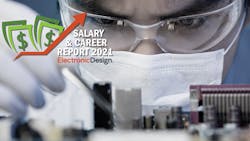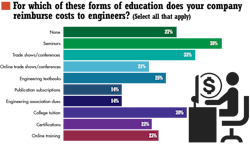2021 Salary & Career Report: Continuing Education
This article is part of the Professional Advancement Series: Annual Salary Survey
This article appeared in Microwaves & RF and has been published here with permission.
“Every project involves so many different technologies that it’s hard to keep up,” says a respondent to our 2021 Salary & Career Report Survey. In a nutshell, that’s the overriding sentiment among engineers when it comes to continuing their engineering educations.
In our survey, we asked you to update us on your current level of education and how you prefer to learn about new technologies and skills. Does your employer encourage continuing education by footing the bill, and if so, in what modes? And how does the coronavirus pandemic figure into the picture? In this article, we’ll look at these topics with facts, figures, and anecdotal responses.
Education Levels Staying on Par
First, let’s look at where you stand with your respective highest levels of education and see how that compares with the 2020 survey responses. The leading response was a master’s degree (near 35% vs. 32% in 2020), followed by a bachelor’s degree (25% vs. 27%). Nearly 16% claim a bachelor’s degree plus some amount of graduate studies. The number of respondents holding a doctoral degree has held steady at 12%. So, these survey results suggest that overall, the levels of education among you are holding steady year-on-year compared to 2020.
No Shortage of Educational Options
No matter what your level of formal education, you must stay abreast of technological developments and trends as you progress in your engineering careers. So, we asked, “What are some of the ways in which you continue your engineering education?”
Repeating last year’s survey, this year’s leading category is engineering/technology publications, on which nearly 72% of respondents rely for keeping up with technology. Close to 66% turn to whitepapers, and about 61% favor engineering videos and publication websites. Webcasts and seminars close out the top tier at about 60%. Vendors to the OEM electronics industry have always done a great job at cranking out videos, whitepapers, and webcasts to educate engineers on their latest and greatest innovations. All of those mediums are free to consume, and webcasts can usually be viewed on demand if you’ve missed the live events.
The in-person modes of continuing education—things like in-classroom college courses, seminars, user-group meetings, and meetups—are a mixed bag compared with last year’s results. College courses are down from 11% to about 9%, but seminars inched up a bit, as did user-group meetings and engineering association-sponsored meetings. One might have expected to see a more general upturn for in-person educational opportunities as the COVID-19 pandemic wanes somewhat.
Online learning also brought mixed results compared with 2020’s results. You’ve been reading more e-books (close to 48% vs. 45% in 2020) and visiting online engineering discussion forums more frequently (19% vs. 17%), but participating less in online college courses (23% vs. 29%). Again, with the pandemic easing its grip on North America, it’s a bit surprising that online learning hasn’t fallen more out of favor. Don’t you want to get out of the house and/or office a little more?
The Great Educational Limiter: Time
In keeping with the puzzling reticence to embrace in-person learning, respondents’ written responses to challenges with taking in relevant engineering information mention COVID much less frequently than last year. It’s not fear of disease that’s preventing folks from venturing out into the world. Rather, as is typically the case in each year’s Salary & Career Report, it’s lack of time that holds them back.
“Finding time to devote to self-directed learning is nearly impossible,” said one respondent, while another chimed in with “I have no time outside of other duties to complete in-depth studies.” But at least one of you scoffs at such excuses: “It should never be a case of trying to find time—MAKE TIME.”
In addition, work-life imbalance is an ever-present issue for engineers, and not everyone wants to take home training materials or extracurricular reading. “The problem is trying to balance home life and education, as work does not allow time for research and learning,” offered one respondent. Indeed, many respondents would rather do it on company time, but it’s just not possible, citing workloads and their employers’ expectations of them.
Another oft-cited roadblock is the sheer volume of material to be sifted through and prioritized. “The problem is discerning what is important in the enormous set of news that comes at us every day,” said one respondent. Meanwhile, another laments that “there are too many avenues to get information from.” Still others cite the combination of the pace of change in the industry and the number of topics to keep abreast of.
To be sure, there’s no shortage of information to be had. Some respondents mentioned the need to vet information, both in terms of accuracy and its relevance to current projects.
Flagging Support from Employers
Finally, we asked whether your employer invests in its engineering staff through reimbursement for the cost of continuing education. Sadly, almost across the board, the trend here is downward when compared with last year’s survey results, and in some cases the drop-off is precipitous.
For example, whereas 48% reported last year that employers offset the cost of attending trade shows and conferences, the number is down to just 37% in 2021. Help with online trade shows and conferences is down to 19% vs. 23% in 2020. Seminar reimbursements dropped to 36% from 41%. Reimbursement for engineering textbooks fell from 30% to 26%, while those for publication subscriptions slipped from 22% to 19%. And, this year, about 26.5% of respondents say their employers don’t reimburse for continuing education costs at all, up from 24% in 2020.
Meanwhile, a couple of bright spots emerged in this regard. When it comes to college tuition, 32% are getting help from employers this year vs. 29% last year. Reimbursements for certifications have stayed on par at 27%. Finally, almost 19% say employers are reimbursing for engineering-association dues, up from 17% in 2020.
Without a doubt, staying abreast of technology trends and project-relevant information is a daunting task. Here’s hoping you’re able to maintain and expand your knowledge base sufficiently in 2022 to keep you at the top of your game.
Read more articles in the Professional Advancement Series: Annual Salary Survey



